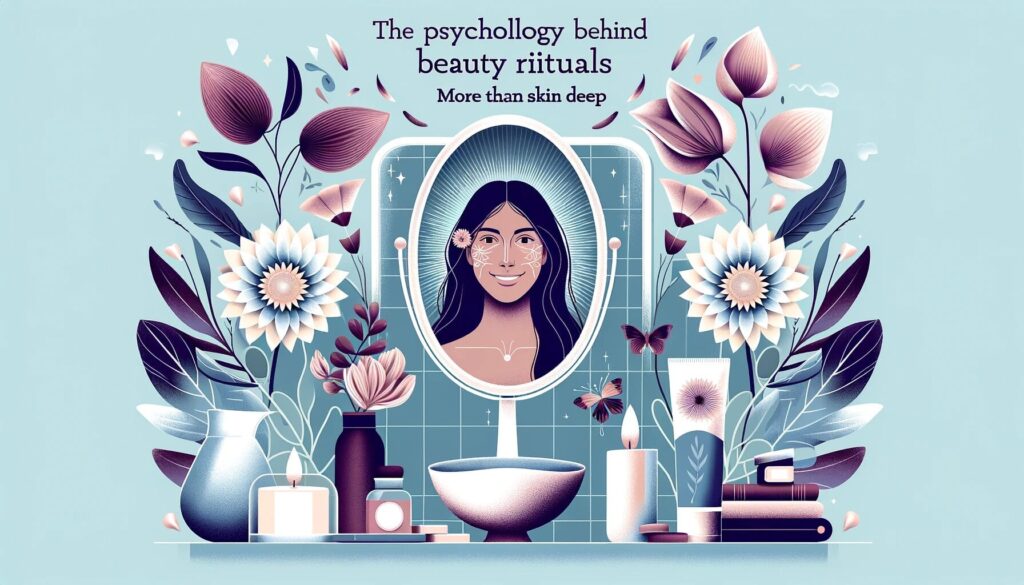Beauty rituals have been a part of human culture for centuries, transcending time, geography, and societal norms. People have dedicated time and effort to enhancing their physical appearance from ancient civilizations to modern-day societies. But why do we engage in these beauty rituals, and what psychological factors drive our fascination with beauty? In this article, we will delve into the psychology behind beauty rituals, exploring the deep-rooted motivations and the impact they have on our self-esteem, well-being, and social interactions.
The Evolutionary Perspective: Attraction and Reproduction
One of the fundamental psychological underpinnings of beauty rituals lies in our evolutionary history. Evolutionary psychology suggests that our ancestors developed an innate preference for certain physical traits that signaled health, fertility, and genetic fitness. For instance, clear skin, symmetrical features, and a youthful appearance are often associated with good health and reproductive potential. Therefore, the pursuit of beauty can be seen as an instinctual drive to attract mates and ensure the survival of our genes.
Symmetry and Beauty
Symmetry is a key element in the perception of beauty. Studies have shown that people tend to find faces and bodies with greater symmetry more attractive. Symmetry is seen as an indicator of good genetic health because it suggests that an individual has been able to develop and grow without significant genetic mutations or environmental disturbances. This preference for symmetry is deeply ingrained in our psychology, driving us to engage in beauty rituals that aim to enhance facial and bodily symmetry.
The Intersection of Mental Health and Beauty Rituals
The relationship between mental health and beauty rituals is a multifaceted one, encompassing both positive and potentially harmful aspects. While beauty rituals can offer therapeutic benefits and contribute to improved mental well-being, they can also become problematic when used as a coping mechanism or a means of self-validation.
Positive Mental Health Benefits:
- Stress Reduction: Engaging in beauty rituals, such as skincare routines or spa treatments, can be a soothing and stress-reducing experience. These rituals provide a moment of self-care and relaxation, allowing individuals to temporarily escape the pressures and anxieties of daily life.
- Boosting Confidence: Beauty rituals can enhance self-confidence and self-esteem. When individuals feel that they look their best, they are more likely to exhibit higher levels of self-assuredness, which can positively impact their mental health.
- Sense of Control: Establishing a beauty routine can create a sense of structure and control, which can be especially valuable for individuals struggling with anxiety or feelings of chaos. Knowing what to expect from their beauty rituals can provide a reassuring and grounding daily routine.
Potential Challenges:
- Obsessive Behavior: Beauty rituals can become obsessive for some individuals, leading to excessive time and money spent on cosmetic procedures or products. This obsession may be driven by underlying mental health issues, such as body dysmorphic disorder (BDD), and can have detrimental effects on overall well-being.
- Dependency on External Validation: Relying on beauty rituals as a source of self-esteem can be precarious. When an individual’s self-worth is tied primarily to their physical appearance, it leaves them vulnerable to fluctuations in confidence based on societal beauty standards and external opinions.
- Masking Underlying Issues: Some people may use beauty rituals as a way to hide or distract from deeper emotional or psychological issues. This masking behavior can prevent individuals from addressing the root causes of their mental health challenges.
It is essential to strike a balance between using beauty rituals for self-care and acknowledging when they may be masking or exacerbating underlying mental health concerns. Seeking professional help when necessary is crucial, especially if beauty rituals become a way to cope with emotional distress or body image issues.
Ultimately, the intersection of mental health and beauty rituals is a nuanced one, with the potential for both positive and negative effects. Beauty rituals can contribute positively to mental well-being when approached mindfully and in moderation. However, it is crucial to remain vigilant and seek help when beauty rituals are used as a substitute for addressing underlying mental health issues.
Social Influence: Cultural and Media Standards
Our concept of beauty is not solely based on evolutionary factors but also heavily influenced by societal and cultural standards. These standards are perpetuated through various forms of media, including advertisements, movies, television shows, and social media. The portrayal of certain beauty ideals in the media can shape our perceptions and influence our beauty rituals.
The Media’s Role in Shaping Beauty Standards
The media often presents a narrow definition of beauty, emphasizing certain features and body types. This portrayal can lead individuals to internalize unrealistic beauty standards, which can profoundly impact their self-esteem and self-worth. People may engage in beauty rituals in an attempt to conform to these standards and gain social acceptance.
Social Comparison and Self-Esteem
Engaging in beauty rituals can also be driven by the desire to fit in and avoid social exclusion. Social comparison theory suggests that people evaluate themselves by comparing their appearance, abilities, and achievements to those of others. When individuals perceive themselves as falling short of societal beauty norms, it can result in lower self-esteem and a sense of inadequacy. Consequently, many individuals turn to beauty rituals to enhance their self-image and boost their self-confidence.
Self-Care and Well-Being
While external factors like evolutionary psychology and societal standards play a significant role in our engagement with beauty rituals, there is also an important internal dimension to consider. Beauty rituals can serve as a form of self-care and contribute to our overall well-being.
Psychological Benefits of Self-Care
Engaging in beauty rituals can be a therapeutic and self-soothing experience. It allows individuals to take a break from their daily routines, focus on themselves, and practice self-care. The act of pampering oneself through skincare routines, makeup application, or grooming can reduce stress, improve mood, and enhance feelings of self-worth.
Rituals and Routine
Beauty rituals’ repetitive nature can also provide stability and control in one’s life. Establishing a daily or weekly beauty routine can create a comforting structure, which can be particularly valuable in times of uncertainty or stress. The act of taking care of one’s appearance can promote a sense of accomplishment and self-discipline.
The Connection Between Beauty Rituals and Self-Esteem
Beauty rituals and self-esteem share a profound and intricate relationship, as engaging in these rituals often significantly impacts an individual’s self-confidence and overall sense of self-worth. These rituals encompass a wide range of practices, including skincare routines, makeup application, grooming, and personal styling. Here, we delve into the connection between beauty rituals and self-esteem, shedding light on how enhancing one’s appearance can contribute positively to one’s mental and emotional well-being.
Engaging in beauty rituals can provide a boost to self-esteem by fostering a sense of self-care and self-love. Taking the time to pamper oneself with skincare routines or experimenting with makeup can convey a message of self-worth and self-respect. This act of self-care can help individuals feel more in control of their appearance, leading to increased self-assurance.
Moreover, beauty rituals offer a canvas for self-expression, allowing individuals to showcase their creativity and individuality. Experimenting with different looks, hairstyles, and fashion choices can boost self-esteem by reaffirming one’s unique identity and personal style. Feeling comfortable and confident in one’s appearance can lead to increased self-assuredness in various situations.
However, it’s crucial to maintain a healthy balance. Overreliance on beauty rituals to validate self-esteem can be problematic. External validation should not be the sole source of self-worth, as it can lead to fragile self-esteem that is easily influenced by societal beauty standards. It’s important for individuals to recognize that their inherent worth goes beyond physical appearance and that beauty rituals should be a tool for enhancing one’s self-esteem, not a determinant of it.
Ultimately, the connection between beauty rituals and self-esteem is complex, with the potential for positive and negative impacts. When approached mindfully, these rituals can serve as a means of self-care, self-expression, and empowerment, contributing to a healthy and confident sense of self-esteem.
Identity Expression and Empowerment
Beauty rituals offer a platform for individuals to express their identity and exercise agency over their appearance. People’s choices in terms of hairstyles, clothing, makeup, and grooming reflect their tastes, values, and cultural affiliations.
Self-Expression Through Beauty
The way we present ourselves to the world can be a powerful form of self-expression. For many, experimenting with different beauty styles is a way to communicate their individuality and creativity. Beauty rituals allow individuals to define and showcase their identity through vibrant hair colors, bold makeup choices, or unique fashion statements.
Empowerment and Confidence
Taking control of one’s appearance through beauty rituals can also empower individuals. When people feel confident and comfortable in their own skin, they are more likely to assert themselves in various aspects of life, from personal relationships to professional endeavors. Empowerment through beauty rituals can lead to increased self-assuredness and a greater sense of agency.
The Dark Side of Beauty Rituals: Obsession and Insecurity
While beauty rituals can have positive psychological benefits, there is a potential downside when they become an obsession or source of insecurity. Excessive focus on appearance and the constant pursuit of an idealized beauty standard can lead to harmful consequences.
Body Dysmorphic Disorder
Body dysmorphic disorder (BDD) is a mental health condition characterized by an obsessive preoccupation with perceived flaws or defects in one’s appearance, even if they are minor or nonexistent. People with BDD may engage in repetitive and compulsive beauty rituals to try to fix their perceived flaws, which can lead to severe distress and impairment in daily life.
Low Self-Esteem and Anxiety
Excessive beauty rituals and a constant quest for physical perfection can lead to chronic low self-esteem and anxiety. The pressure to meet unrealistic beauty standards can create a cycle of dissatisfaction and negative self-perception, ultimately undermining one’s mental well-being.
Bottom Line
In conclusion, the psychology behind beauty rituals is a complex tapestry woven from a myriad of influences, including evolutionary instincts, societal standards, individual preferences, and psychological well-being. While these rituals have evolved over time, their underlying motivations remain deeply rooted in our human nature, including our desire for attraction, self-expression, and well-being.
Beauty rituals can be a source of empowerment, allowing individuals to boost their self-esteem, express their unique identities, and find moments of self-care in their daily lives. These practices provide avenues for creativity, self-expression, and personal growth, ultimately enhancing our sense of self-worth.
However, it is crucial to recognize that beauty rituals should complement, not replace, our inherent self-esteem. When taken to the extreme or used as a means of conforming to unrealistic standards, they can have detrimental effects on our mental health and self-perception. Striking a healthy balance between self-improvement and self-acceptance is essential.
In today’s diverse and inclusive society, celebrating the many facets of beauty is more important than ever. Beauty rituals should enhance one’s individuality and confidence, foster self-love, and acknowledge that beauty is subjective and ever-evolving.
Ultimately, the psychology behind beauty rituals reminds us that beauty is not merely skin deep; it’s a reflection of our inner desires, cultural influences, and personal journeys. Understanding this complex interplay can help us navigate the world of beauty with greater mindfulness, ensuring that these rituals enrich our lives while maintaining our fundamental sense of self-worth and authenticity.

